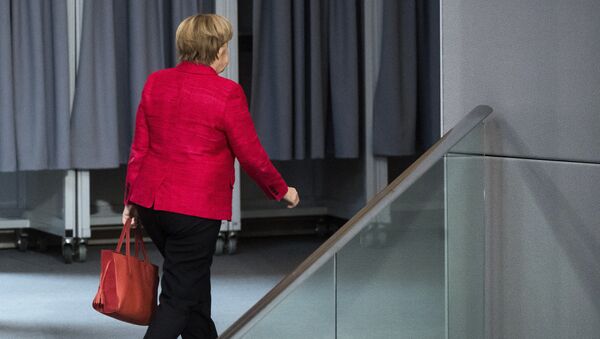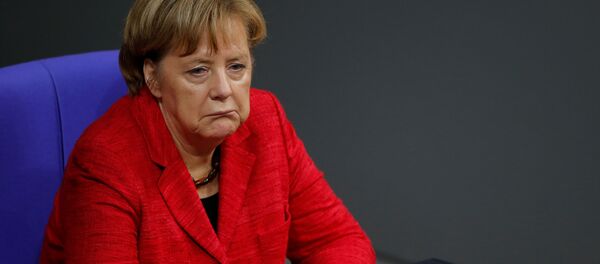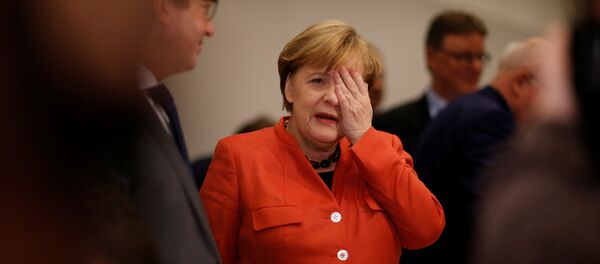Following the recent breakdown of coalition talks, Germans favor new elections rather than a minority government, according to an opinion poll published by Bild on Wednesday.
Almost half (49.9%) of respondents told the survey that they are in favor of new elections; 20% said they were in favor of a minority government led by Angela Merkel.
The CDU/CSU and SPD agreed to form a "grand coalition" in 2013 but following a poor election result on September 24, when his party came second with 20.5% of the popular vote, SPD leader Martin Schulz ruled out another coalition and said that his party will spend the parliamentary term in opposition.
The CDU/CSU gained 32.9% of the popular vote in the election; both the main parties recorded their worst result since the 1940s. In third place was Alternative for Germany (AfD) with 12.6%, the classically liberal Free Democratic Party (FDP) was fourth with 10.7%. The September 24 election cost €92 million ($108 million) and a rerun is unlikely to be less expensive.
Following the collapse of coalition talks in Germany, here is a reminder of the formation of the Bundestag after September's election. #Germany #CDU #CSU #SPD #AfD #FPD #DieLinke #Grune #Merkel #Bundestag pic.twitter.com/JAc4J3NrR6
— Complete Politics (@CompletePol) 20 ноября 2017 г.
Tagesspiegel reports that "pressure is growing on Martin Schulz" within the SPD to discuss the possibility of another coalition. Former SPD leader Bjoern Engholm told the newspaper that "the SPD must reconsider its decision if the country is threatened by instability in domestic and foreign policy."
Negotiations to form a so-called "Jamaica Coalition" of the CDU/CSU, the Greens and the FDP collapsed on Sunday night after the FDP pulled out.
In an interview with the Frankfurter Allgemeine Zeitung (FAZ), FDP leader Christian Lindner blamed the Greens and Angela Merkel for failing to offer sufficient compromises.
"The potential for compromise is limited when it comes to a partner being humiliated. Unfortunately this was what we perceived was on the table in the end," Lindner explained.
Without the Greens' demands, there would "undoubtedly" have been agreement, the FDP leader added.
The FDP was in coalition with Merkel's CDU/CSU from 2009-2013, but many within the party feel it paid dearly for the cooperation. Finance Minister Wolfgang Schaeuble blocked its tax-cutting plans and in elections in September 2013 the FDP's share of the vote dropped by 9.8% to just 4.8%, leaving it just short of the 5% barrier which parties must overcome to receive seats in the Bundestag.
According to the poll conducted for Bild, 27.6% of Germans would like to see another coalition of the CDU/CSU and the FDP and 15.7% would like to see a coalition of the CDU/CSU and the Greens. Just 2.9% of voters said they supported the formation of a so-called "Jamaica Coalition" of all four parties – the potential alliance was dubbed Jamaica because of the parties' colors.
#INSA-Umfrage #AfD erstmals auf 14 Prozent! Union kommt nur noch auf 30 Prozent! #MerkelMussWeg 💨 pic.twitter.com/7jy2wjLtp1
— Peter (@finis_euro) 21 ноября 2017 г.
This Insa poll published on Wednesday shows losses for the CDU/CSU and gains for the other parties in a potential new election.
#btw Wahlumfrage Bundestagswahl, Civey, 21.11.17: CDU/CSU: 29,2% (−1,8), SPD: 19,5% (−0,9), AfD: 13,6% (−0,1), FDP: 13,2% (+2,2), Grüne: 11,9% (+1,7), Linke: 8,4% (−1), Sonstige: 4,1% (−0,2) https://t.co/dk8BH5za2B pic.twitter.com/ZQYxslzcrp
— DAWUM — Wahlumfragen (@dawum_de) 21 ноября 2017 г.
This Civey poll shows gains for the Greens and the FDP if a new election were held.
Despite the breakdown of the last round of negotiations, the Greens have said they remain open to participation in government with the CDU/CSU. The leftist Die Linke is only willing to form a left-wing government with the SPD and Greens.




